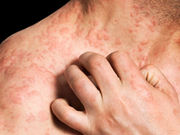IgE reactivity to bacterial antigens more frequent in atopic dermatitis patients sensitized to HDMs
THURSDAY, July 27, 2017 (HealthDay News) — For patients with atopic dermatitis (AD), house dust mites (HDMs) may act as carriers for immunoglobulin E (IgE) sensitization to microbial antigens, according to a study published online July 25 in Allergy.
Sheron Dzoro, from the Medical University of Vienna, and colleagues used IgE immunoblotting to analyze plasma samples from 179 AD patients for IgE-reactivity to a panel of micro-arrayed HDM allergen molecules and to Staphylococcus aureus and Escherichia coli. The authors tested antibodies specific for S. aureus and E.coli antigens for reactivity to nitrocellulose-blotted extract from purified HDM bodies, and detected IgE-reactive antigens by IgE-immunoblot inhibition experiments. IgE ImmunoCAP inhibition experiments were performed to quantify IgE antibodies directed to bacterial antigens in HDMs.
The researchers found that compared to AD patients without HDM sensitization, IgE-reactivity to bacterial antigens was significantly more frequent in AD patients sensitized to HDMs. In immune-blotted HDM extract, S. aureus and E. coli antigens were detected, while qualitative and quantitative IgE inhibition experiments demonstrated the presence of IgE-reactive antigens in HDMs.
“HDMs may serve as carriers of bacteria responsible for the induction of IgE sensitization to microbial antigens,” the authors write.
One author disclosed financial ties to the pharmaceutical industry.
Copyright © 2017 HealthDay. All rights reserved.








